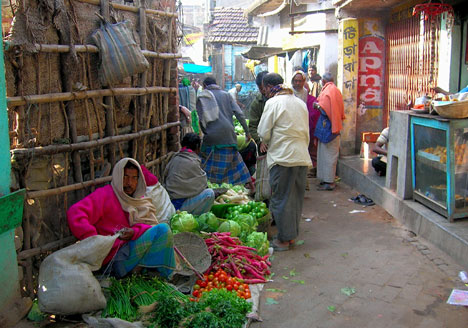
We arrive in Canning, the nearest railhead to the Sundarbans, by road after 9pm. Us two, not a couple, both on work. Her baby, the baby's caretaker - a dude with a mohawk and blonde highlights - and the driver.
Our journey back to Calcutta is to commence in six hours. We will be taking the day's first Canning-Sealdah local at 3.50am; that train ferries hundreds of domestic help, vendors, ayahs from the suburbs to the heart of the city.
It had been a long day and we need to wrap up early so we can brave the even longer day ahead. No sooner do we reach Canning than we start looking for a hotel.
Someone tells the driver about a bed-and-breakfast place at one Sankar da's near the station. We drive through a wholesale fish market. The baby cackles at the sight of giant sting-rays and crabs glowing under incandescent lights. She is the only one unaffected by the stink.
Sankar da turns out to be a jolly fellow sitting peacefully under a garlanded photograph of a stern-looking man - his father, as we later learn. It is a busy "eating house" with a long list of fish items, including the rare-sounding kamila and ihudi. But when we ask for two rooms, he nods, "Nothing for you." Instead, he recommends three places - Debraj, Mohana and Ekanta Apon.
Debraj turns out to be a shack by a pond. A bare-bodied man in a lungi is guarding its entrance. The reception doubles as the kitchen. A matronly woman is screaming instructions to a teenage boy while she is peeling a pile of potatoes. Time and again her eyes stray towards a small TV that is playing a Bengali TV serial.
The man in the lungi, who turns out to be the manager, screams at the boy who comes scurrying with a bunch of keys. He leads us down a corridor, deeper and deeper, till we reach a door that opens into a claustrophobic space lit by a 40-watt lamp. We can see two stark beds in a windowless room. I rush for the exit, where I find the manager sitting with a knowing smile. "No AC rooms?" I ask, "We have a baby with us." He replies solemnly, " Na dada. I prefer clients who are used to the harsh realities of life."

Once again we hit the road. It is not long before we spy a flex signage that reads "Ekanta Apon"; loosely translated it means - yours intimately. Unable to locate the entrance to the lodge I call one of the numbers on the signage.
A man answers after a dozen rings. "Knock on the door of the spectacles shop," he instructs. "But the shop is closed," I reply, sleepy and irritable. "Doesn't matter. You knock. Three times," he barks. I follow and what do you know, it is a Khulja Sim Sim moment.
Someone turns on the lights inside the shop. A hawkish man appears out of nowhere. "So you want a room? How many people? Do you have a woman with you," he rattles off. I am somewhat taken aback. "Err. Yes, my colleague and her child. And two other men," I reply. The man surveys us all and the car. "Follow me. Fast," he says with unfeigned urgency.
It's difficult to keep pace with him. We reach a four-storey building that looks like a godown. We go up a makeshift winding staircase. I don't dare look down. The man leads me to a room on the third floor.

The minute I step in, I get a whiff of a strong room freshener and cheap whiskey. The man switches on the air conditioner and the ancient window machine makes a whirring sound. I peep into the bathroom which looks like a battle site, broken shower, shattered clothes rack. The man quips, "Drunken brawls. Sorry for that. But, I can assure there will be no police raids. You can bring your woman in." I thank him profusely for nothing and leave.
It's 10.30pm by now. Enough is enough with hotels, I think. The child is getting restless and hungry. We decide to spend the night in the car after getting some maach-bhaat at Sankarda's hotel. But when we reach his eatery, he tells us of yet another place that he had forgotten to tell us about earlier - Pather Saathi. "There's no air conditioner though," he warns us.
We finish dinner and rush. The caretaker, a genial old man, ushers us in, shows us big airy rooms. Without any fuss, he asks us to sign the register. "Please hurry up, Sir, bedtime is at 11.30pm." As I pay him, he says, "My gut says you are good people."
As the estuarine breeze blows in from the Matla river, the baby gurgles with joy.











